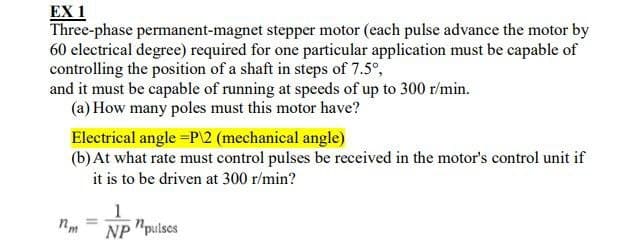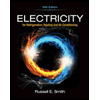Three-phase permanent-magnet stepper motor (each pulse advance the motor by 60 electrical degree) required for one particular application must be capable of controlling the position of a shaft in steps of 7.5°, and it must be capable of running at speeds of up to 300 r/min. (a) How many poles must this motor have? Electrical angle =P\2 (mechanical angle) (b) At what rate must control pulses be received in the motor's control unit if it is to be driven at 300 r/min?
Three-phase permanent-magnet stepper motor (each pulse advance the motor by 60 electrical degree) required for one particular application must be capable of controlling the position of a shaft in steps of 7.5°, and it must be capable of running at speeds of up to 300 r/min. (a) How many poles must this motor have? Electrical angle =P\2 (mechanical angle) (b) At what rate must control pulses be received in the motor's control unit if it is to be driven at 300 r/min?
Electricity for Refrigeration, Heating, and Air Conditioning (MindTap Course List)
10th Edition
ISBN:9781337399128
Author:Russell E. Smith
Publisher:Russell E. Smith
Chapter8: Basic Electric Motors
Section: Chapter Questions
Problem 28RQ: What are the advantages and disadvantages of using the following types of motors?
shaded-pole...
Related questions
Question
i need the answer quickly

Transcribed Image Text:EX 1
Three-phase permanent-magnet stepper motor (each pulse advance the motor by
60 electrical degree) required for one particular application must be capable of
controlling the position of a shaft in steps of 7.5°,
and it must be capable of running at speeds of up to 300 r/min.
(a) How many poles must this motor have?
Electrical angle =P2 (mechanical angle)
(b)At what rate must control pulses be received in the motor's control unit if
it is to be driven at 300 r/min?
1
NP "pulses
%3D
Expert Solution
This question has been solved!
Explore an expertly crafted, step-by-step solution for a thorough understanding of key concepts.
Step by step
Solved in 2 steps

Knowledge Booster
Learn more about
Need a deep-dive on the concept behind this application? Look no further. Learn more about this topic, electrical-engineering and related others by exploring similar questions and additional content below.Recommended textbooks for you

Electricity for Refrigeration, Heating, and Air C…
Mechanical Engineering
ISBN:
9781337399128
Author:
Russell E. Smith
Publisher:
Cengage Learning

Electricity for Refrigeration, Heating, and Air C…
Mechanical Engineering
ISBN:
9781337399128
Author:
Russell E. Smith
Publisher:
Cengage Learning